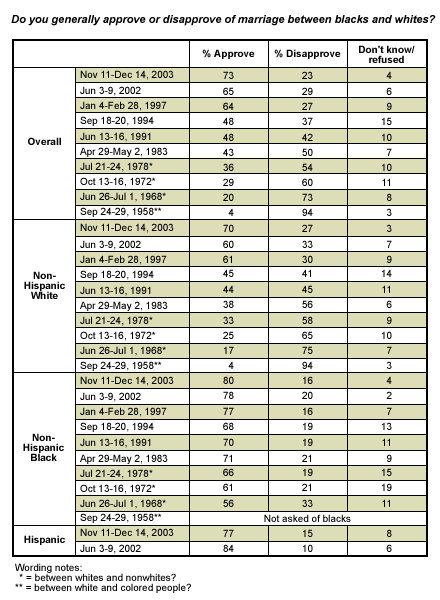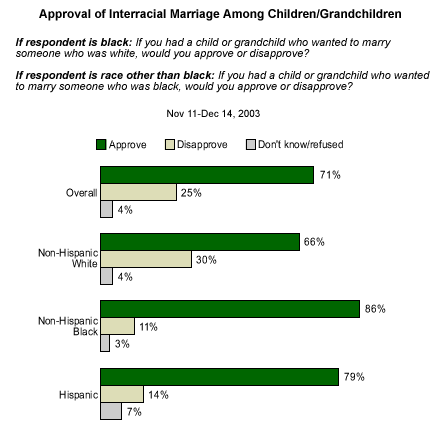Fifty years after the landmark school desegregation case of Brown v. Board of Education, survey evidence suggests some relatively recent shifts in American opinions about race. In order to assess change since the civil rights movement began a half-century ago, a recent Gallup Poll conducted for the American Association of Retired Persons (AARP)* included questions on a variety of racial integration and tolerance issues.
For the first time since Gallup began asking Americans this question in 1998, a majority of Americans view the current state of race relations in the country as either "somewhat" or "very" good. In addition to this general sentiment, another interesting barometer of race relations has continued to rise: approval of interracial marriage. According to the results of the latest poll, more Americans than ever approve of marriage between blacks and whites, and a firm majority say they would approve of a marriage between their child or grandchild and a person of another race.
The actual prevalence of interracial marriage is low -- according to Census Bureau estimates, less than 1% of U.S. marriages include both a white spouse and a black spouse -- but has approximately doubled since the early 1980s. While Gallup did not ask Americans about the racial makeup of their own marriages, results show that Americans are significantly more accepting of these unions today than they were in the early 1980s. In 1968, only 20% of Americans approved of marriage between "whites and nonwhites." By 1983, 43% said they approved of marriage between blacks and whites, and in the most recent survey conducted for AARP, 73% of Americans expressed approval toward black-white marriages. This percentage is up significantly since Gallup last asked the question in June 2002.

While a majority of black adults have consistently approved of marriage between whites and nonwhites since Gallup began asking this question of blacks in 1968, only 17% of whites approved in 1968. It wasn't until 1997 that a majority of whites expressed approval toward black-white marriages. According to the latest survey, 70% of whites and 80% of blacks approve of marriage between whites and blacks.
Younger Americans are more likely than older Americans to approve of marriage between blacks and whites (approval ranges from 85% among the 18- to 29-year-olds to just 47% among those 65 and older).
The level of approval among whites is also clearly related to education: 62% of whites with a high school education or less approve, compared with 83% of white college graduates. Urban dwellers and those living in the East also express higher levels of approval toward black-white marriage.
Approval of Cross-Race Marriages "Closer to Home"
While 7 in 10 Americans would approve of their own child or grandchild marrying someone across what used to be called "the color line," clear differences emerge by race. Majorities of both whites and blacks would approve of their child or grandchild marrying outside their race, but blacks are substantially more likely to approve than whites (86% vs. 66%). Age is also related to opinion on this topic, with older Americans expressing less accepting opinions than younger Americans (45% approval among Americans 65 and older, compared with 83% among those under 30).
Whites who have graduated from college express more acceptance (80%) than those who have a high school education or less (55%), although this pattern does not hold true for blacks.

Bottom Line
While expressions of acceptance toward racial equality have increased markedly over past decades, it is a principle that is not categorically embraced by American adults. More than a quarter of whites disapprove of marriages between blacks and whites, and 30% of whites say they would disapprove if their child or grandchild wanted to marry someone who was black.
And while some of the trends are moving in a more accepting direction, Americans are not optimistic about the future of race relations. The survey finds that more than 7 in 10 blacks and 6 in 10 whites feel that relations between whites and blacks will always be a problem in the United States, and 37% of blacks currently characterize the state of race relations in the United States as "somewhat" or "very" bad. While changes in racial attitudes have occurred -- some of them relatively recently -- Americans are still treading the path that civil rights pioneers set them upon a half-century ago, and a substantial part of the journey still lies ahead.
*The AARP/Gallup poll results are based on telephone interviews with 2002 adults, aged 18 and older, conducted between Nov. 11 -- Dec. 14, 2003. For results based on the total sample, one can say with 95% confidence that the margin of sampling error is ±5 percentage points.
For results based on the 446 national adults who identify as African American/black -- but not Hispanic, the maximum margin of sampling error is ±8.5 percentage points.
For results based on the 915 national adults who identify as white -- but not Hispanic, the maximum margin of sampling error is ±6.7 percentage points.
For results based on the 551 national adults who identify as Hispanic -- including those who identify as white or black or other, the maximum margin of sampling error is ±6.2 percentage points.
In addition to sampling error, question wording and practical difficulties in conducting surveys can introduce error or bias into the findings of public opinion polls.
